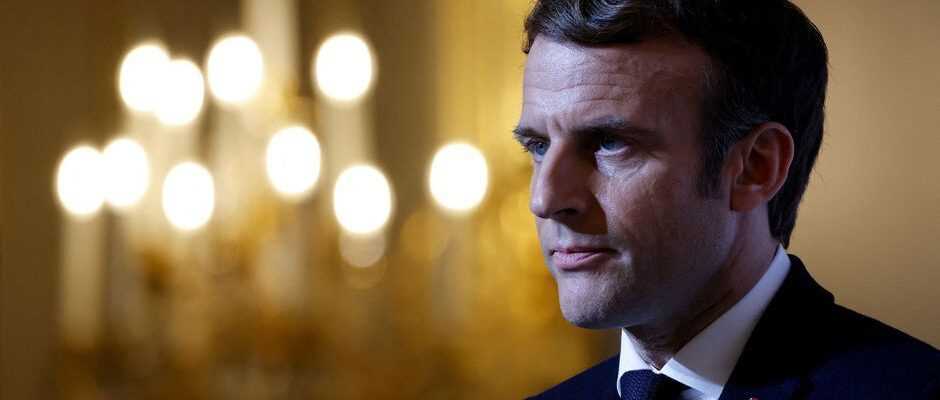Frédéric Dabi, political scientist and director general of Ifop, analyzes for Paris Match the first week of our daily Ifop-Fiducial survey for Paris Match-LCI-Sud-Radio.
Launched three months to the day before the first round, the Rolling Ifop-Fiducial for Paris Match, LCI and Sud Radio scrutinizes the presidential election in real time. At the end of a first week of measurement, it appears that the voting intentions of the French thwart expectations. Did Emmanuel Macron’s verbatim towards the unvaccinated cost him? Does Valérie Pécresse’s victory allow her to win on the right? Answers.
Emmanuel Macron in pole position
Whatever the first-round hypothesis tested, the outgoing president monopolized pole position throughout the week in which the Rolling started: Emmanuel Macron gathered at least a quarter of the voting intentions expressed, up to 27%, i.e. levels comparable to those measured until the end of last year. In any case, neither his exit on his desire to “annoy” the unvaccinated – in which some saw a formidable vector of “de-presidentialization” – nor the unacknowledged launch of his campaign as president-candidate dented its electoral capital. The “rock” Emmanuel Macron, constant in voting intentions, thus resists erosion and capitalizes on strength segments acquired both since the start of his five-year term and more recently: “at the same time” the youngest (36 % on Friday the 14th) and the oldest (26%), executives (33%), the most qualified (31%), the wealthiest (34%)… and a significant proportion of Benoît Hamon’s electorates (22% ) and François Fillon (15%) in 2017, proof that the current tenant of the Élysée is still a center of gravity in the political landscape.
On the other hand, the recent mobilization of teachers and parents of coalition students constitutes a threat taken seriously at the top of the State and, in the event of a stalemate, could penalize the outgoing president if the designated target of the movement changes from the Minister of National Education to Emmanuel Macron himself. Similarly, the rise in the cost of energy, in a climate where purchasing power emerges in third position among the determinants of the vote, represents a sword of Damocles hanging over the head of state.
Second place uncertainty
The “blast effect” is over. While in December, Valérie Pécresse saw voting intentions jump in her favor after she was crowned with her victory in the Republican primary, Emmanuel Macron’s opponent only started the week in third place in terms of voting intentions, behind Marine Le Pen (15.5% against 17.5%).
However, the president of Ile-de-France has benefited in recent days from a slight dynamic which has gradually brought her back to the same level as the candidate of the National Rally: now “touch-key” (17%) , Valérie Pécresse and Marine Le Pen are more than ever vying for second place in the first round of the presidential election, in a context where the entry ticket for the second round seems remarkably low due to the bursting of the offer election, the lowest since April 21, 2002. However, we should not forget the third challenger on the right: with 13.5% of voting intentions, Éric Zemmour has not seen his candidacy fall after his impressive dynamic of fall and remains a serious competitor in this “wild primary” of the right and the extreme right.
“The Left Evaporated”
Added together, the voting intentions in favor of all the left-wing candidates (even extreme!) barely reach… the level of Emmanuel Macron, that is to say about a quarter of the votes, or even less. With a historically low total (against 43.8% in 2012 and 27.7% in 2017… if we ignore the 24% of candidate Macron) and a bursting of candidacies, the left hardly seems to exist at the start of the campaign . Among the many candidates in the running, Jean-Luc Mélenchon remains the most popular (8.5 to 9.5% of voting intentions), ahead of Yannick Jadot (5.5 to 7%). On the socialist or related side, more than marking time, the candidacy of Anne Hidalgo recorded a slight decline this week, dropping from 4 to 3.5% of voting intentions.
In the event of an additional candidacy from Christiane Taubira, if the mayor of Paris does not seem to be losing ground (with scores of 3 to 3.5%), the former Keeper of the Seals nevertheless manages to level the playing field, or even exceed it: in the Rolling of Friday January 14, Christiane Taubira emerges at 4.5% of the voting intentions, one point ahead of her rival from the Socialist Party, in particular thanks to her ability to capture voters who would have opted for Yannick Jadot (12%) or Jean-Luc Mélenchon (8%) in his absence. With such low scores and such a large dispersion, the next few days of liar poker around a possible left-wing primary will be one to watch closely.
Any reproduction prohibited
